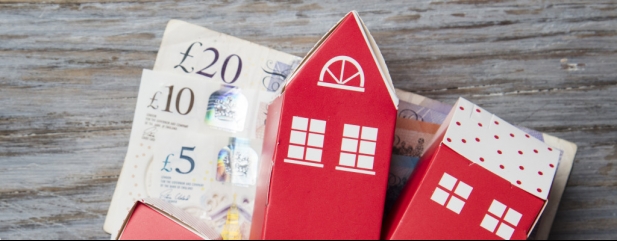Archived article
Please note that tax, investment, pension and ISA rules can change and the information and any views contained in this article may now be inaccurate.
Mortgage holidays: what are they and how do they work?

More than 1.2m people have taken advantage of mortgage payment holidays after the Government told banks they had to offer them to customers. But how do these holidays work and what do they cost in the long term?
As part of its package of measures to help people affected by the coronavirus outbreak the Government said that mortgage providers had to offer people the chance to take a mortgage payment holiday for up to three months (although some banks were already offering this).
The take-up has been huge, with UK Finance, the trade body for banks, saying that now one in nine mortgages in the UK are on a payment holiday. It saw a surge in applications in the two weeks between 25 March and 8 April, with around 61,000 mortgage holidays being granted each day.
As the mortgage is usually the biggest monthly outgoing in any household, taking a break from paying it for three months can give people some breathing space if they’ve seen their income fall or lost their job all together. However, it’s not a cost-free option, so make sure you know the pros and cons before you take advantage.
HOW DOES THE HOLIDAY WORK?
You need to speak to your bank if you want to take the holiday. Some are offering information and forms to fill in online, while others will insist that you call up to request the holiday. Due to staff shortages and an influx of calls some people have been frustrated with how long they’ve been left on hold to wait to speak to someone, but you’ll have to persevere if your mortgage provider won’t let you process the application online.
Under no circumstances should you just cancel your direct debit and assume that the mortgage provider will take that to mean you want a mortgage holiday – this will be seen as you just failing to make the mortgage payment that month, which will reflect poorly on your credit file.
You can take a holiday for up to three months, which means that you effectively pause the mortgage payments for that time. But you could just take a one-month break if that’s all you think you’ll need, as it will cost less in the long run.
HOW MUCH WILL IT SAVE ME?
This really depends on how much you’ve borrowed and what type of mortgage you have. UK Finance says that on the average mortgage size of £132,128, assuming an interest and capital-repayment mortgage, the average person will save £775 a month in deferred payments, which is a big chunk of money for any household.
WHY ISN’T THIS FREE?
While you won’t pay your mortgage during that three-month period (assuming you take the maximum holiday) you will still accrue interest in that time that you won’t be paying off. That means that you’ll face a higher total cost of the mortgage over the term of it.
If you assume a £125,000 mortgage debt with 25 years remaining at 3% interest, equating to a £593 monthly repayment, the total additional cost of a three-month deferral is £750. Considering you’ll pay this back over the remaining term of the mortgage you may think this is a small sum to pay to give you breathing space – and for many people that’s the right call. You just need to make sure you’re aware it’s not a totally free option.
For those with larger mortgages the cost will be higher, as the interest you’ll accrue in that three month break will be higher. For example, someone with £400,000 of borrowing at an interest rate of 3% would see the three-month break cost £2,399 more in interest overall.
Also, the higher your interest charge the more you’ll pay. If you’ve fallen onto your lender’s Standard Variable Rate, which is usually their highest rate and the one you are moved onto when any fixed-rate or offer period ends, you could be paying up to 5% – or even more.
So at this level the additional interest you accrue during the three-month break is higher. On £400,000 of borrowing at a 5% interest rate you’ll pay £5,278 more in interest, more than double the example above, while on the £125,000 mortgage, also at 5%, you’ll pay £1,649 more.
HOW DO I REPAY THE MONEY?
Most banks will increase you mortgage payments after the holiday is over to make up for the payments you missed. So you’ll still pay your mortgage off in the same time period but you’ll just pay slightly more each month. This increase will be to pay for the three months’ worth of missed payments plus the additional interest.
Using the same examples above, taking the three-month break on the £400,000 mortgage with 25 years remaining on it at a 3% interest rate would mean your monthly repayments rose by £27 a month for the remaining 25 years of the mortgage. At the £125,000 borrowing level, assuming the same term and interest rate, your monthly repayment would rise by £9 a month.
But, the increases are partly because the additional cost and missed payments are spread over such a long period, as there is 25 years left on the mortgage. If you’re closer to paying off your mortgage you’ll see a bigger hike – simply because there are fewer months left to make up that shortfall. So if you cut the remaining term down to five years in the above examples the additional monthly cost rises to £127 at £125,000 of borrowing and £407 extra on £400,000 of borrowing.
This means that if you’re taking a mortgage holiday you need to factor in that your costs are going to be higher once you start paying it again. You also need to prepare for when the three-month holiday is over, as your finances and income might not have improved by then.
There is a chance the Government could extend the three-month period, depending on how long the country is in lockdown for, but there have been no signs of that so far and that certainly shouldn’t be your battle plan.
There’s a calculator here that will help you to work out the finances of it all.
WHAT ARE MY OTHER OPTIONS?
If you’re paying a high interest rate or are on your lender’s Standard Variable Rate then you could instead switch to a new mortgage and cut your monthly mortgage costs by moving to a better deal. This is only an option for those who still have sufficient income to pass the affordability tests from mortgage companies, which depends on what your income is, how much you’re borrowing, the equity you have in your home and your other monthly costs.
But with the Bank of England having cut interest rates again, mortgage rates are at rock-bottom levels and so you could cut your costs significantly – particularly for those with larger borrowing. On £400,000 of borrowing over 25 years at a 5% interest rate your monthly repayments would be £2,338 but at a 1.5% interest rate they would fall to £1,600 – saving you more than £700 a month.
Clearly this isn’t an option for those who have seen their entire income wiped out – partly because they might not be eligible for a new mortgage and partly because it still leaves them with a large outgoing each month, but for example, those who have been furloughed and are still getting 80% of their salary, it could be a more long-term option.
Another route is to speak to your lender and ask if moving to an interest-only mortgage is an option. This means that you’ll only be paying off the interest each month, so will mean a big reduction in your monthly payments.
You’ll still need to work out how to repay the capital but it could buy you some time and breathing space. A similar option is extending the term of your mortgage, which means your monthly costs will fall – although as you’ll be borrowing the money over a longer period you’ll pay more interest in the long run.
Important information:
These articles are provided by Shares magazine which is published by AJ Bell Media, a part of AJ Bell. Shares is not written by AJ Bell.
Shares is provided for your general information and use and is not a personal recommendation to invest. It is not intended to be relied upon by you in making or not making any investment decisions. The investments referred to in these articles will not be suitable for all investors. If in doubt please seek appropriate independent financial advice.
Investors acting on the information in these articles do so at their own risk and AJ Bell Media and its staff do not accept liability for losses suffered by investors as a result of their investment decisions.

 magazine
magazine











